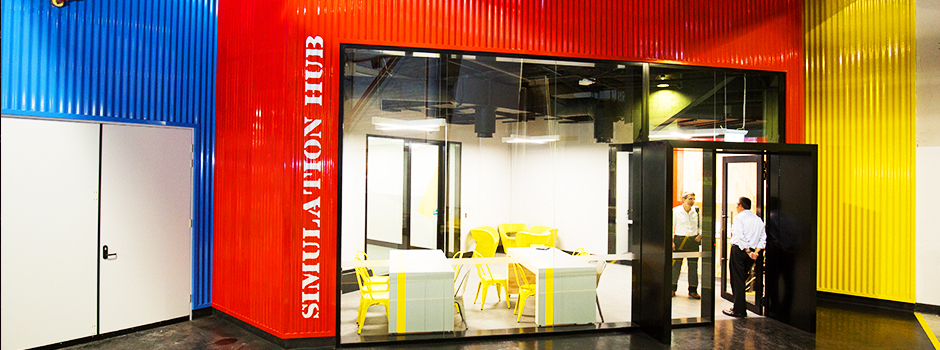Home, work and recreation simulation lab

Photo caption: Exterior of the Simulation Hub only shown to preserve the novelty of these three rooms for research participants.
These rooms were created to simulate a living room, an office, and a bar environment. We designed them to be naturalistic, with an additional emphasis on making them as different from each other as possible.
Lounge, Office and Bar Labs
These rooms were created to simulate a living room, an office, and a bar environment. We designed them to be naturalistic, with an additional emphasis on making them as different from each other as possible.
Many learning and memory theories postulate that individuals learn an association between events and their contexts and that memory retrieval will be better if testing conditions match learning conditions. Instructional, eyewitness, and fear extinction research support this assumption. For example, if an individual studies for an exam in their living room while feeling little stress then they will have better recall of that information if tested under these same conditions than if they take an exam in a university classroom when feeling highly anxious. Moreover, when people repetitively engage in a behaviour within one context, that context can undergo conditioning. For example, if a person consistently drinks alcohol at a bar, that person will start to crave alcohol from simply walking into this setting.
Thus, these rooms were created so that methods to understand conditioning and extinction as well as methods to improve memory recall outside of a person's learning environment can be discovered. The lounge and office setting were developed because much of people's learning occurs at home and at work and we often expect learning in one of these environments will transfer to the other. The bar room was developed to understand the effects of drinking alcohol and to find ways to help people stop drinking when they encounter problems.
These rooms are managed by Associate Proffessor Melissa Norberg, the Director of the Behavioural Science Laboratory and the Deputy Director of the Centre for Emotional Health
Other labs and rooms
The Simulation Hub also has a multi-purpose laboratory that is used to prepare solutions, store specimens, and enable participants to recover from motion sickness after a simulation experience. Additionally, the Hub has a large waiting room that showcases current projects via a slide-show presentation on large-flat screen TV. The simulation laboratories are co-located around central control rooms to facilitate both collaboration and the cross-fertilisation of initiatives.
Services and access
- Research collaboration support
- Consultation services
- Contract research & development
The labs are available to internal researchers. External researchers may hire them for research purposes. Please contact our lab leaders - Dr Melissa Norberg
Connect with us
Please contact our lab leader - Dr Melissa Norberg

Dr Melissa Norberg
Behavioural Science Lab Leader
Senior Lecturer
Department of Psychology
